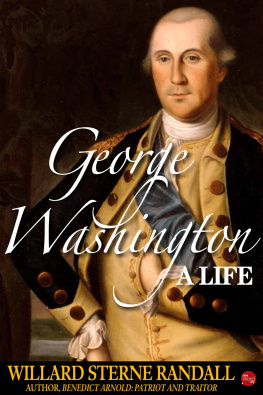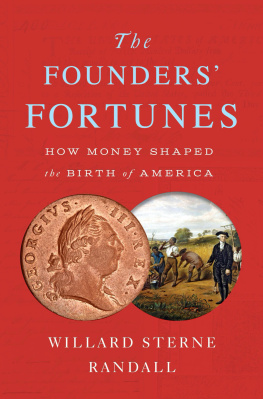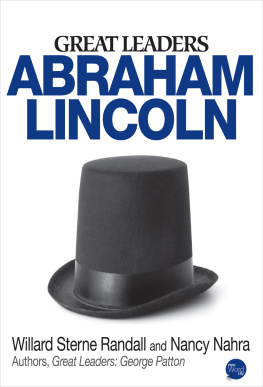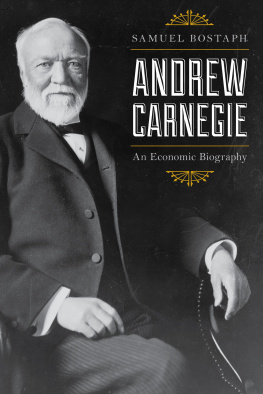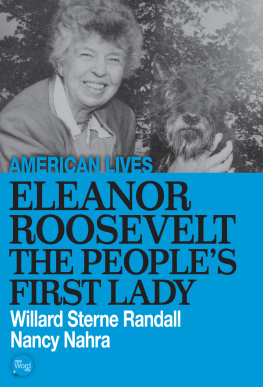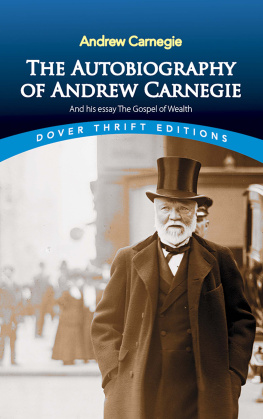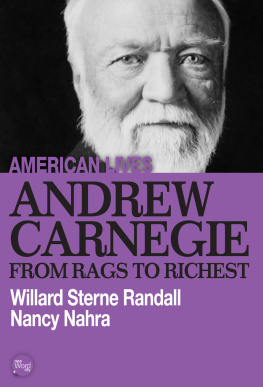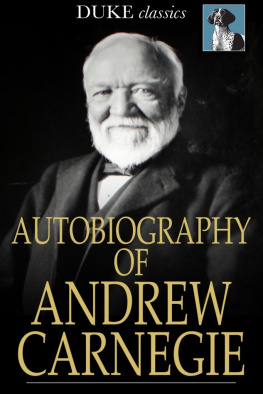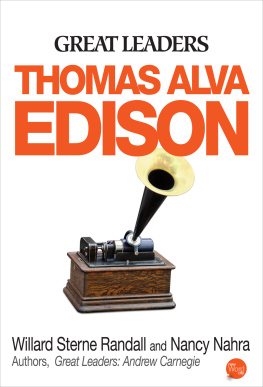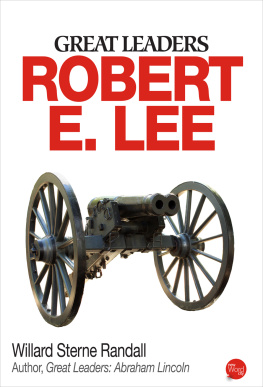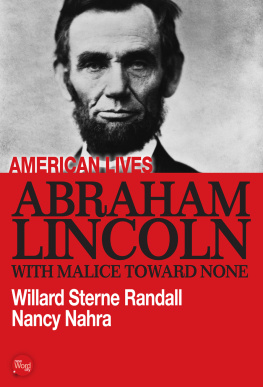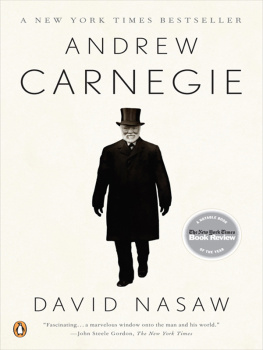Willard Sterne Randall - Andrew Carnegie
Here you can read online Willard Sterne Randall - Andrew Carnegie full text of the book (entire story) in english for free. Download pdf and epub, get meaning, cover and reviews about this ebook. year: 2013;2014, publisher: New Word City, LLC, genre: Detective and thriller. Description of the work, (preface) as well as reviews are available. Best literature library LitArk.com created for fans of good reading and offers a wide selection of genres:
Romance novel
Science fiction
Adventure
Detective
Science
History
Home and family
Prose
Art
Politics
Computer
Non-fiction
Religion
Business
Children
Humor
Choose a favorite category and find really read worthwhile books. Enjoy immersion in the world of imagination, feel the emotions of the characters or learn something new for yourself, make an fascinating discovery.
- Book:Andrew Carnegie
- Author:
- Publisher:New Word City, LLC
- Genre:
- Year:2013;2014
- Rating:3 / 5
- Favourites:Add to favourites
- Your mark:
- 60
- 1
- 2
- 3
- 4
- 5
Andrew Carnegie: summary, description and annotation
We offer to read an annotation, description, summary or preface (depends on what the author of the book "Andrew Carnegie" wrote himself). If you haven't found the necessary information about the book — write in the comments, we will try to find it.
Willard Sterne Randall: author's other books
Who wrote Andrew Carnegie? Find out the surname, the name of the author of the book and a list of all author's works by series.
Andrew Carnegie — read online for free the complete book (whole text) full work
Below is the text of the book, divided by pages. System saving the place of the last page read, allows you to conveniently read the book "Andrew Carnegie" online for free, without having to search again every time where you left off. Put a bookmark, and you can go to the page where you finished reading at any time.
Font size:
Interval:
Bookmark:
Andrew Carnegie was born on November 25, 1835, in the attic of a small, one-story house in the ancient town of Dunfermline, Scotland, that had been the medieval seat of Scottish kings. He was, by his own account, the child of poor but honest parents. When he was forced to leave Dunfermline to emigrate to the United States with his family in 1848, he could not possibly have imagined that one day he would return, the wealthiest man in the world, to build a castle of his own, where his personal bagpiper would awaken him every morning.
Carnegies father, William, a master linen weaver, was well known in radical circles in Scotland as an organizer of workers marches against repressive English laws and an activist in the Chartist movement, which sought to democratize the British Isles by opening Parliament to representatives of the working people.
On his mother Margarets side, Carnegie came from even more radical stock. Her father, a shoemaker by trade, was one of Scotlands most irrepressible labor agitators. A fiery and eloquent speaker, he campaigned for democratic elections, an English republic modeled on the United States, new factory laws, freedom of trade, destruction of hereditary privileges among aristocrats, and the abolition of kings, the monarchy, and armies.
Carnegies free-spirited parents lived only briefly in the house where he was born. They soon began to enjoy a booming damask-weaving trade that would last for another ten years. Formal schooling for Andrew began at the age of eight, his parents having kept him home until he declared himself ready. He was allowed to spend his days wandering the surrounding hills, soaking up the history of his homeland. His tutor was his uncle, George Lauder, a dreamy romantic who operated a grocery store but preferred to spend his time teaching Andrew about flowers, music, and the poetry of Robert Burns and William Shakespeare. Meandering through the fanciful setting where Macbeth and Malcolm had drawn swords, young Carnegie learned about democracy as he memorized Burns revolutionary verses. His uncle also taught him all he knew - and much that he imagined - about the United States and men such as George Washington, Thomas Jefferson, and Benjamin Franklin.
The Carnegie familys decline was rapid and unexpected. In 1836, Will Carnegie had such a good year that he bought a bigger house and three more looms and hired more apprentices. Seven years later, when a water-powered, damask-weaving mill opened in Dunfermline, Will would never again find steady work. The family hung on for five years, selling off one loom after another, letting apprentices go, selling their house, and moving back to a one-room cottage where Margaret learned to cobble shoes and ran a little dry-goods store out of her living room.
Finally, in 1847, Will, a broken man at forty-two, told his son, Andra, I canna get nae mair work. Andrew Carnegie never forgot that day: I remember that shortly after this I began to learn what poverty meant. Dreadful days came when my father took the last of his webs to the great manufacturers - and I saw my mother anxiously awaiting his return. It was burnt into my heart then that my father had to beg (for work). And then and there came the resolve that I would cure that when I got to be a man.
It was Carnegies gritty, determined mother who decided the family must emigrate. They would follow two of her sisters to America - to the grimy, smoky industrial town of Pittsburgh, Pennsylvania, the center of iron manufacturing in the United States. Borrowing from relatives the last twenty pounds they needed to pay for passage, the Carnegies embarked on a journey that took eleven weeks - the entire summer of 1848 - by steamer, sailboat, and Erie Canal barge. They were so broke by voyages end that they spent the last night of their journey sleeping on a wharf. Without a penny to their name, the Carnegies moved into two rent-free upstairs rooms in a dingy factory neighborhood called Slabtown.
Andrew Carnegie subsequently went from Slabtown to uptown, and his life has lessons every leader can learn.
With the help of relatives and old friends who had left Scotland earlier, the entire family, except five-year-old Tom, found jobs. At age twelve, Andrew had the thrill of earning his first wages. He went to work oiling newly made bobbins in the cotton mill where his father labored. They left the house together before dawn, and, except for a forty-minute lunch break, worked until after dark. Andrew liked the regular pay, later writing that, I was now a helper of the family, a breadwinner.
Pittsburgh had jobs enough for everyone. Soon, another emigrant from Dunfermline offered Andrew $2 a week to work for him in the cellar of a textile factory, where the young man ran a steam engine and fired the boiler that kept the machinery working. The responsibility was too much for me, he said. I found myself night after night sitting up in bed trying the steam gauges.
The employers self-interest and Carnegies neat handwriting soon came to his rescue. He became a clerk in the office, making out weekly bills, writing correspondence a few days a week, and dipping bobbins in preservative oil the other days. The smell of oil would make him sick for the rest of his life. As much as he appreciated making more money, he admitted, I never succeeded in overcoming the nausea.
Within a few months, another opportunity appeared: A friend of an uncle was managing a new telegraph office and needed a bright lad. As a telegraph-delivery boy, Andrew earned $2.50 a week.
He was small (five feet, three inches), fast, and learned the city quickly. He also developed an uncanny knack for reading the telegraph key by ear before messages could be printed out. He had taught himself Morse code. Carnegie soon won promotion to telegrapher at a wage of $4 a week. He had more than tripled his earnings in a single year.
By age sixteen, Andrew Carnegie had gained a reputation as the best telegrapher in Pittsburgh just as the Pennsylvania Railroad arrived in the city. Thomas A. Scott, the superintendent of the lines western division, was often in the telegraph office and took a liking to the young man he called my boy Andy. Scott saw something of himself in Carnegie - both were ambitious and both had grown up dirt-poor. Scott offered Carnegie a job as his personal telegrapher and private secretary at the then-enormous sum of $35 a month. Carnegie leapt at the chance.
As Scotts secretary, Carnegie had a unique vantage point. Present at the creation of the eras most modern and efficient business system, he watched and learned as the railroads adapted traditional management and finance techniques to fit their vast size and complexity. In twelve years with the Pennsylvania Railroad, the young man gained priceless experience. His job gave him managerial skills, a knowledge of economic principles, and a network of business colleagues.
A new kind of business was taking shape. Because railroads demanded vast amounts of capital to expand, Carnegie learned that selling shares of corporate stock and bonds enabled growth with less risk than that associated with borrowing and paying interest. But to pay regular dividends to investors and salaries to workers, the railroads had to be run efficiently, with passenger and freight trains going round-the-clock. There was no product other than efficient service.
The emerging railroad system was the first business to adapt a military-style system of rank and discipline, and it became the apex of corporate bureaucracy ceaselessly carrying out complex operations.
Carnegie participated in the brisk growth that made the Pennsylvania the largest private business in the world by the end of the Civil War. The railroad comprised 3,500 miles of track, 30,000 employees, hundreds of locomotives, and thousands of railroad cars. As Tom Scotts right-hand man, young Carnegie not only learned to deal with the new managerial class, but also had a master class in how to earn the loyalty and hard work of people on the front line. Having grasped the railroads operations so thoroughly in his first year, Carnegie was soon taking on greater responsibility. For instance, when a train derailed early one morning before his boss arrived, he telegraphed orders - signing them with Scotts initials - to burn the cars blocking the main rail line and get traffic moving again.
Next pageFont size:
Interval:
Bookmark:
Similar books «Andrew Carnegie»
Look at similar books to Andrew Carnegie. We have selected literature similar in name and meaning in the hope of providing readers with more options to find new, interesting, not yet read works.
Discussion, reviews of the book Andrew Carnegie and just readers' own opinions. Leave your comments, write what you think about the work, its meaning or the main characters. Specify what exactly you liked and what you didn't like, and why you think so.



